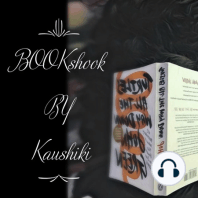12 min listen
Episode-5 Kamala
FromBOOKshook
ratings:
Length:
33 minutes
Released:
May 5, 2020
Format:
Podcast episode
Description
Siddhartha walks alone and becomes fascinated by all that is around him, seeing it for what it is and nothing more. He had always sought for a deeper meaning in everything, for Atman. Now he does not seek anything but instead experiences it all for what it is. The sun shines around him, and the river flows. He feels the wind blowing through rice fields, and suddenly all is calm within; Siddharta becomes "so simple, so childlike." Everything is beautiful. Reflecting, the man marvels at what wise words he had uttered to the Buddha before leaving, since they were words which he did not really understand. Yet he had spoken them. He realizes that trying to deny his Self had been wrong. Siddhartha had never even known what his Self was, or what Siddhartha was really all about. Instead, he had only adopted the teachings of others without hearing the thoughts of his Self.
He had inflicted suffering upon his body, yet he knows now that his "body was certainly not the Self, not the play of senses, nor thought, nor understanding, nor acquired wisdom or art with which to draw conclusions and from already existing thoughts to spin new thoughts...Both thought and the senses were fine things...it was worthwhile listening to them both...to listen intently to both voices" Chapter 5, pg. 39. Siddhartha had never denied his Self at all, for he never even really knew his Self before or listened to its desires or needs. The Self had been merely suppressed and kept undeveloped. This awakened identity and sense of Self guide him now as the path continues. Like the Buddha, he hopes to be enlightened by listening to the voice within him instead of ignoring it.
By nightfall he arrives at a river and sleeps in a ferryman's hut before crossing the water that following morning. Siddhartha has a strange dream about his friend Govinda appearing and asking why he would not become a disciple of Buddha with him; then he transforms into a full breasted woman whom Siddhartha is filled with desire for, and he kisses her brown nipple. Sweet milk fills his lips and tastes of many things in nature and in the world. It fills him with pleasure and consumes his senses, for he only now begins to embrace his body's desires. Awakening the next day, the ferryman takes Siddhartha across the river even though he cannot pay him for the service. The ferryman speaks mysteriously, murmuring only that Siddhartha shall return later to repay him, and that he has learned a lot just by listening to the sound of the river. As Siddhartha reaches the other side of the river and prepares to leave, the ferryman sends his blessing of good luck although Siddhartha is arrogant within and judges this man to be simple and subservient, as Govinda had been. Considering himself to be a stronger person, he tells himself that "People are children." Having crossed the river, Siddhartha's journey to explore the desires of his Self continues.
Please do visit these blogs
1-Lessons A Millennial Child Learnt From 90s Epic Ramayan (https://www.womensweb.in/2020/05/lessons-a-millennial-child-learnt-from-90s-epic-ramayan/)
2-Era of stories in India(https://chaotictrain.blogspot.com/2020/04/era-of-stories-in-india.html)
3-Must watch if you are crazy about movies and web shows(https://wemedia.co.in/article/wm/38b3b9da5b3c468197768a632f703dd2)
BY- Kaushiki
---
Send in a voice message: https://anchor.fm/kaushiki-mishra/message
He had inflicted suffering upon his body, yet he knows now that his "body was certainly not the Self, not the play of senses, nor thought, nor understanding, nor acquired wisdom or art with which to draw conclusions and from already existing thoughts to spin new thoughts...Both thought and the senses were fine things...it was worthwhile listening to them both...to listen intently to both voices" Chapter 5, pg. 39. Siddhartha had never denied his Self at all, for he never even really knew his Self before or listened to its desires or needs. The Self had been merely suppressed and kept undeveloped. This awakened identity and sense of Self guide him now as the path continues. Like the Buddha, he hopes to be enlightened by listening to the voice within him instead of ignoring it.
By nightfall he arrives at a river and sleeps in a ferryman's hut before crossing the water that following morning. Siddhartha has a strange dream about his friend Govinda appearing and asking why he would not become a disciple of Buddha with him; then he transforms into a full breasted woman whom Siddhartha is filled with desire for, and he kisses her brown nipple. Sweet milk fills his lips and tastes of many things in nature and in the world. It fills him with pleasure and consumes his senses, for he only now begins to embrace his body's desires. Awakening the next day, the ferryman takes Siddhartha across the river even though he cannot pay him for the service. The ferryman speaks mysteriously, murmuring only that Siddhartha shall return later to repay him, and that he has learned a lot just by listening to the sound of the river. As Siddhartha reaches the other side of the river and prepares to leave, the ferryman sends his blessing of good luck although Siddhartha is arrogant within and judges this man to be simple and subservient, as Govinda had been. Considering himself to be a stronger person, he tells himself that "People are children." Having crossed the river, Siddhartha's journey to explore the desires of his Self continues.
Please do visit these blogs
1-Lessons A Millennial Child Learnt From 90s Epic Ramayan (https://www.womensweb.in/2020/05/lessons-a-millennial-child-learnt-from-90s-epic-ramayan/)
2-Era of stories in India(https://chaotictrain.blogspot.com/2020/04/era-of-stories-in-india.html)
3-Must watch if you are crazy about movies and web shows(https://wemedia.co.in/article/wm/38b3b9da5b3c468197768a632f703dd2)
BY- Kaushiki
---
Send in a voice message: https://anchor.fm/kaushiki-mishra/message
Released:
May 5, 2020
Format:
Podcast episode
Titles in the series (100)
एपिसोड 30 - सीता की विदाई by BOOKshook
